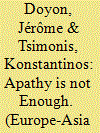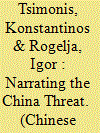| Srl | Item |
| 1 |
ID:
187292


|
|
|
|
|
| Summary/Abstract |
Chinese campuses have been remarkably calm since the post-1989 repression. Yet, the absence of contention masks profound changes in the party-state’s campus management tactics, exemplifying the different approaches authoritarian regimes employ to regiment students. Based on fieldwork before and after Xi Jinping’s rise to power (2012), we analyse the party-state’s move from a ‘corporatist’ to a ‘partification’ strategy on campus. Contrary to the literature that sees apathy and depoliticisation as the goal of the party-state’s management of campuses, we argue that these changes reveal the regime’s apprehension about student alienation from official political channels and constitute an effort to reverse it.
|
|
|
|
|
|
|
|
|
|
|
|
|
|
|
|
| 2 |
ID:
175841


|
|
|
|
|
| Summary/Abstract |
This article unpacks the discursive construction of a European ‘China Threat’ narrative by European think tanks. We theorise think tanks as crucial actors in the securitising process, especially at the initial stages where ideas and reference frames are formed. Despite having no decision-making authority, think tanks participate as securitising actors in the process of idea formation and bidding, articulating a securitised frame of reference for policy makers. In the case of EU–China relations, we observe an emerging congruence between think tanks and policy makers that engage in a non-linear construction of a ‘China Threat’ policy frame. In this article, we review key think tank reports that are circulated through official EU policy channels and deconstruct the assumptions behind the ‘China Threat’ discourse. We first argue that, analytically, their securitising attempt is characterised by a distorted representation of Chinese economic activities abroad, including those falling under the Belt and Road Initiative. Second, politically, this narrative produces a distorted notion of European politics where pluralism is weakness and disagreement dissent, promoting a view of the EU where ‘responsible’ core countries must contain the periphery’s ‘opportunism’. Third, we contend that despite defending ‘Europeanness’ as the epitome of human rights and democracy, the securitisation of Chinese FDI rests on othering practices that risk undermining those very ideals. By identifying the problematic undertones of this securitising effort, we call for a fact-based and pluralistic debate on the challenges of Chinese investment and financing for European economies and societies.
|
|
|
|
|
|
|
|
|
|
|
|
|
|
|
|